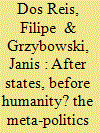|
|
|
Sort Order |
|
|
|
Items / Page
|
|
|
|
|
|
|
| Srl | Item |
| 1 |
ID:
193484


|
|
|
|
|
| Summary/Abstract |
In the debate on the (de-)judicialisation of international affairs and the International Criminal Court (ICC) specifically, the distinctions between legality and politics and between state sovereignty and the international remain contested. While realist and legalist approaches discuss the transformation of international politics by international criminal law, sociological and critical-legal perspectives instead highlight the politics of international criminal law. In this contribution, we focus on how the distinctions between (international) law and politics matter, not as substantively opposed spheres, but as boundaries that the ICC itself contingently and flexibly draws when considering particular situations. These meta-politics of invoking and reproducing key boundaries in seemingly technical elaborations of the interest of justice, the scope of its jurisdiction, or the application of complementarity reflect the Court’s particular authority but also its predicament of pushing for an international criminal law serving humanity, rather than states, while reproducing the distinctions between (international) law and politics. We illustrate the Court’s meta-politics by revisiting three recent decisions of the ICC to (not) investigate alleged international crimes committed by British forces in Iraq, by the Taliban, governmental, and US forces in Afghanistan, and by Israeli authorities and Palestinian groups in the West Bank, East Jerusalem, and Gaza.
|
|
|
|
|
|
|
|
|
|
|
|
|
|
|
|
| 2 |
ID:
120610


|
|
|
|
|
| Publication |
2013.
|
| Summary/Abstract |
This article investigates whether it is possible and recommendable that corporate criminal responsibility should be introduced for international crimes and that the International Criminal Court should therefore have jurisdiction over legal entities. This article adopts the French proposal on corporate criminal liability, presented during the drafting process of the Rome Statute, as preliminary normative framework, and links this framework with case law of both domestic and international criminal courts in which individual business leaders stood trial on charges of complicity in international crimes. The recurrent question is whether it would have been fair and feasible in those situations to hold the legal entity which these corporate agents were representing criminally responsible as well. The analysis reveals that the answer to this question would undoubtedly have been affirmative. The author argues that the cases which have been investigated represent particularly strong instances of corporate involvement in international crimes. The knowledge and contributions of corporate agents which are required to incur criminal responsibility for complicity in international crimes correspond and correlate with their position of power and control within the corporation, which is necessary to implicate the legal entity.
|
|
|
|
|
|
|
|
|
|
|
|
|
|
|
|
| 3 |
ID:
183412


|
|
|
|
|
| Summary/Abstract |
Russia’s official position regarding the prosecution for violations of
International Humanitarian Law (IHL) in international criminal courts
changed during the 1990s and the 2000s. The article studies the reasons
for these changes by reviewing works of Russian experts. The performance
of the International Criminal Tribunal for the former Yugoslavia (ICTY) had
a negative impact on Russia’s position. Russian experts questioned the
impartiality of the ICTY and its effectiveness in preventing such crimes and
reconciling the parties.
Russia’s position has also changed with regard to the International Criminal
Court (ICC). In 2000, the Russian Federation signed the Rome Statute that
established the ICC, but withdrew its signature in November 2016. One
of the reasons for that decision was the participation of Russian troops
in armed conflicts outside of the Russian Federation and outside of UN
peacekeeping missions. Russian experts emphasize that IHL norms are
enforced primarily at the national level, which means that Russia can make
its own decisions regarding criminal prosecution for IHL violations.
|
|
|
|
|
|
|
|
|
|
|
|
|
|
|
|
|
|
|
|
|